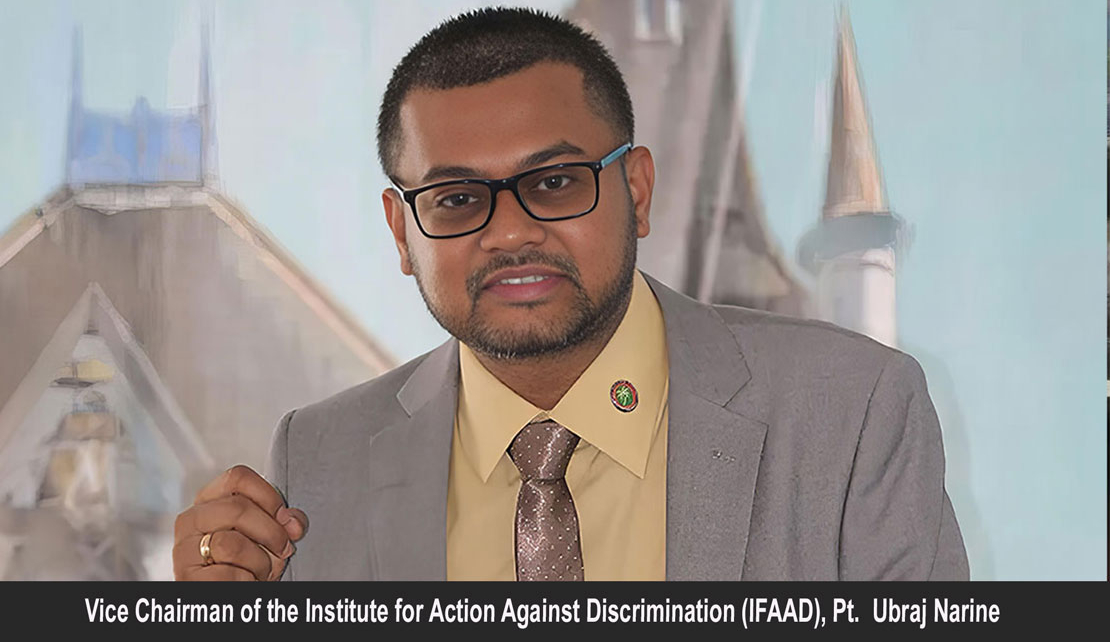GUYANA | IFAAD Calls for Commission of Inquiry into spate of Killings in Guyana from 2002 to 2006

GEORGETOWN, Guyana, April 3, 2024 - In a bold move demanding justice and transparency, the Institute for Action Against Discrimination (IFAAD) has called for the establishment of an international commission of inquiry into the tumultuous period of Bharrat Jagdeo's presidency in Guyana from 2002 to 2006.
Amidst a backdrop of violence, human rights abuses, and systemic discrimination that marred Jagdeo's tenure, Vice President of IFAAD, Pt Ubraj Narine argues that only an inquiry led by impartial international experts can truly uncover the truth and offer solace to the victims and their bereaved families.
Throughout Jagdeo's presidency, Guyana was besieged by incidents that not only shocked the nation but also caught the vigilant eyes of the international community, including the United Nations Commission of Human Rights.
The alarming levels of violence and discrimination during this period have prompted urgent calls for a comprehensive and unbiased examination to ensure those affected receive the justice long denied to them.

Furthermore, the expertise and credibility of a commission populated by seasoned investigators promise a thorough and authoritative probe into the allegations, potentially leading to accountability for the crimes committed under Jagdeo's administration.
Moreover, IFAAD emphasizes that adherence to international human rights standards by the commission would restore public faith in the inquiry's fairness and legitimacy.
By adopting a comprehensive approach that scrutinizes the violence from multiple dimensions, including political, social, and historical perspectives, the commission could offer a nuanced understanding of the factors that fueled discrimination and violence, thereby paving the way for national healing and reconciliation.
In a resounding plea, IFAAD urges the Guyanese government, civil society organizations, and the global community to rally behind the formation of the international commission.
Such a step, according to IFAAD, is crucial not only for dispensing justice but also for eradicating discrimination and fostering a society rooted in equality and peace.
With a steadfast commitment to collaboration, IFAAD stands ready to support all efforts aimed at facilitating a fair and impartial inquiry, one that addresses the grievances of the victims and assists in the healing process.
The push for an international commission of inquiry by IFAAD isn't just about bringing past atrocities to light; it's a crucial step towards healing a nation scarred by years of unchecked violence and discrimination.
The Institute's insistence on an external body to oversee the investigation highlights a profound mistrust in local mechanisms, which are often seen as susceptible to political influences and biases. This call for impartiality seeks not only to ensure a fair investigation but to restore faith in the process of justice itself, a sentiment echoed across Guyanese society.
International commissions of inquiry are not novel but have been instrumental in resolving complex issues of human rights violations worldwide. Their success lies in the unbiased perspectives they bring, coupled with a mandate that transcends local political considerations.
By advocating for such a commission, IFAAD envisions a process that not only scrutinizes the events of 2002-2006 with the meticulousness they warrant but also sets a precedent for accountability that could deter future leaders from flouting the rule of law and human rights.
Furthermore, the global stature of an international commission ensures adherence to the highest standards of human rights, offering a beacon of hope for those who have long felt marginalized and voiceless.
This commitment to international norms is vital for rebuilding trust amongst Guyana's populace, who have been disillusioned by years of internal strife and governance that often seemed to turn a blind eye to their suffering.
The comprehensive scope that an international commission offers could also provide a holistic understanding of the underlying issues that fueled the violence and discrimination during Jagdeo's presidency.
This is not merely about assigning blame; it's about understanding the root causes of the conflict to ensure that the nation does not repeat the mistakes of the past. Such an investigation could lay the groundwork for genuine reconciliation, enabling Guyanese to confront their history and move forward with a shared vision of peace and unity.
As IFAAD stands at the forefront of this ambitious call to action, the response from the Guyanese government, civil society, and the international community remains to be seen.
Yet, the very act of demanding such an inquiry sends a powerful message: that the pursuit of justice and truth transcends political affiliations and national boundaries. It is a testament to the resilience of the human spirit and an unwavering belief in the principles of equality and human dignity.
In conclusion, the proposed international commission of inquiry into the violence during Bharrat Jagdeo's presidency represents more than just a quest for justice; it embodies a pivotal moment in Guyana's history.
It is a call to address the wounds of the past, to learn from them, and to forge a future where respect for human rights and the rule of law is paramount. For Guyana, this could be a defining step towards reconciliation, healing, and the creation of a more inclusive and peaceful society.
-30-
